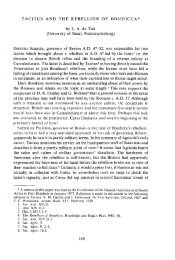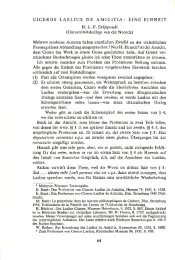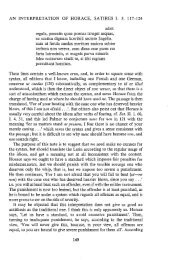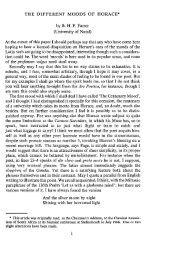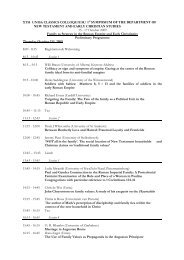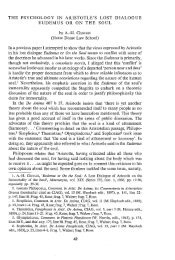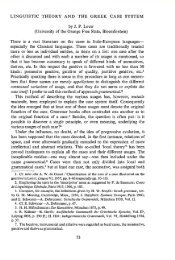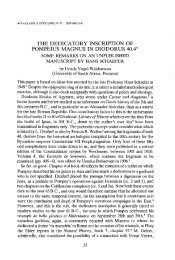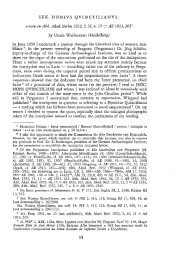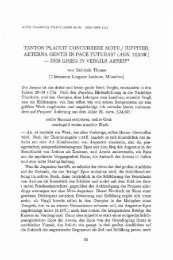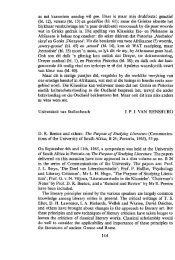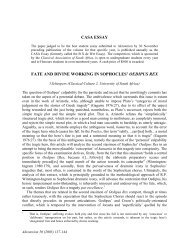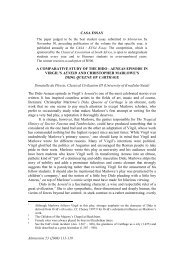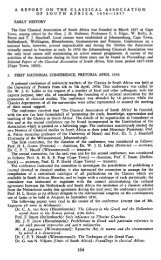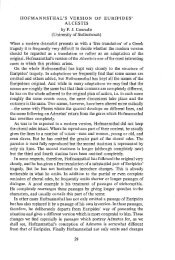TIBERIUS, PISO, AND GERMANICUS by Terence T. Rapke ...
TIBERIUS, PISO, AND GERMANICUS by Terence T. Rapke ...
TIBERIUS, PISO, AND GERMANICUS by Terence T. Rapke ...
Create successful ePaper yourself
Turn your PDF publications into a flip-book with our unique Google optimized e-Paper software.
and the overall reliability of the passage are not strong, it nevertheless confirms<br />
the impression that the position Piso enjoyed under Augustus was one of<br />
eminence and trust, an impression which is quite inconsistent with late and<br />
probably unreliable allegations of provincial maladministration, coming as they<br />
did from a notoriol}S delator. 21<br />
During the reign of Augustus, therefore, the role ofPiso was that of a loyal and<br />
esteemed public servant. Like his father before him, the suffect consul of 23 BC<br />
whose acceptance of his shortlived position as Augustus' colleague 'sealed his<br />
acquiescence in the new dispensation' /" the consul of 7 BC and governor of<br />
Africa and Hither Spain seems to have come to tenus with the Principate.<br />
Certainly not a man who was ingenio violentus et obsequii ignarus/ 9 still less any<br />
trace of the rigor and iracundia that characterizes his behaviour in Seneca's<br />
anecdote. 311 Surprisingly, perhaps, his attitude towards his Princeps appears to<br />
have been very different under Tiberius, insofar as it can be reconstructed from<br />
Tacitus and Dio. On no less than three. occasions during the first two years of the<br />
new reign did Piso openly and cantankerously clash with his former consular<br />
colleague. The first was the case of Granius Marcellus, propraetorian governor of<br />
Bithynia, tried before the Senate in AD 15 on a charge of maiestas. 31 Incensed <strong>by</strong><br />
the manner in which the accused had demonstrated his disrespect for both<br />
himself and, particularly, Augustus, Tiberi us declared that he would vote openly<br />
and under oath so that the rest of the Senate would be compelled to do likewise. It<br />
was then that Piso displayed one of those vestigia morientis libertatis <strong>by</strong> asking his<br />
Emperor whether he would vote first or last. In the Tacitean version , Tiberius<br />
was repentant of his outburst and permitted Granius Marcellus to be acquitted. If<br />
Suetonius 32 is referring to the same trial , a conviction still resulted. A second<br />
species libertatis was inflicted on Tiberi us <strong>by</strong> Piso, again before the Senate, in the<br />
following year. 33 In the face of obsequious opposition from C. Asinius Gallus and<br />
with Tiberius observing the exchange in stony silence, Piso argued that the<br />
decorum rei publicae demanded that the Senate continue to meet and transact<br />
business during the absence of Tiberius from Rome. Strikingly, in view of the<br />
argument to follow , we find Asinius Gallus maintaining that any public business<br />
discussed without the presence ofTiberius would appear unimportant as a result.<br />
Seager ,3-1 attempting to create a 'Republican' Tiberius, 35 misinterprets the exchange<br />
as ret1ecting more credit on Piso than Gallus in the eyes of his Princeps. If Seager<br />
is correct, then either Tiberius was a poor manager of senatorial business or<br />
auctoritas principis counted for little since Gallus' view prevailed and the Senate<br />
was adjourned. 36 The third clash also occurred in AD 16 over the question of the<br />
punishment of citizens found practising astrology. 37 On this occasion the Senate<br />
voted for the motion of Piso recommending the acquittal of all citizens so<br />
accused, and against the wishes ofTiberius and Drusus. The timely use of his veto<br />
<strong>by</strong> an unnamed tribune ensured that the Princeps and his son were not overruled<br />
on this matter. I cannot agree with Marsh 38 that the authenticity of the incident is<br />
suspect because Tacitus failed to mention it. Quite the opposite, in fact. An<br />
occasion on which the Senate decisively tlouted the stated desire ofTiberius does<br />
63
around Rome, once the illness of Germanicus in AD 19 became known, to the<br />
effect hoc egisse secretos Augustae cum Plancina sermones, permits precisely such<br />
a conclusion to be drawn. The ability of Livia to influence Tiberius to make the<br />
requested appointment is another matter. While <strong>by</strong> no means would I assent to<br />
the idea of Livia as some kind of co-regent under either Augustus or Tiberi us as<br />
suggested <strong>by</strong> Kornemann, 56 the influence of Livia over Tiberius, particularly<br />
during the early years of his principate, is too well documented in our sources to<br />
be ignored. 57 That Livia could and would exert herself to promote individual<br />
careers is illustrated <strong>by</strong> the case of C. Fufius Geminus who rose all the way to the<br />
ordinary consulship of AD 29 gratia Augustae. 58 I, thus, have little doubt that<br />
Livia was instrumental in securing Syrian legateship for Piso. Likewise, I am<br />
fairly sure that once Tiberi us had been convinced of the need to give Piso a rna jor<br />
military command as befitted his status, the choice of Syria was more or less<br />
automatic. As we have already seen ,S 9 the order in which Tacitus narrates the<br />
events of AD 17 at Annals 2.43.2-3 makes it clear that Germanicus' appointment<br />
as proconsul with imperium maius over all the Eastern provinces preceded<br />
Tiberius' decision to send Piso to Syria. That Tiberius felt uncomfortable about<br />
the situation he had been placed in <strong>by</strong> Livia and Plancina is demonstrated <strong>by</strong> his<br />
admission at Annals 3.12.2 that the command in Syria was granted to Piso a se<br />
auctore senatu.<br />
Surprisingly, perhaps, this unique example of the Senate being consulted on<br />
the question of an appointment to an imperial province has received little<br />
scholarly attention. Furneaux 60 rightly described it as 'a very remarkable instance<br />
of (Tiberius') habit of making the senate share responsibilities even in his own<br />
department', but then proceeded to cite two inappropriate and irrelevant<br />
parallels. 6 ' In fact there are no parallels, and Dio's lucid explanation of the<br />
differences between imperial and senatorial governors and provinces, written as<br />
it was from the vantage point of over two hundred years of imperial practice, fails<br />
to suggest such a possibility. 62 Nevertheless, it would be rash to contradict Tacitus<br />
on this point. Piso probably enjoyed considerable support among the senators if<br />
his ability to carry a motion in the teeth of opposition from Tiberi us and Drusus in<br />
the previous year, AD 16, is any indication. 63 In all probability, Tiberius, when<br />
faced with having to appoint Piso to a province against his better judgement,<br />
decided to share the possible consequences of such action with the Senate. For<br />
the same reason, Tiberius decided that Piso should be tried <strong>by</strong> the whole Senate 64<br />
rather than <strong>by</strong> the praetor in charge of the quaestio perpetua de sicariis et<br />
veneficis 65 or the iudices in foro. 66 Even though Tiberi us himself was requested <strong>by</strong> the<br />
prosecution to hear the case, 67 I cannot accept Jones' view that he 'clearly<br />
considered judging the case himself. 68 Just as Tiberius had made the Senate<br />
partially responsible for the decision to appoint Piso to Syria, likewise he insisted<br />
that it accept responsibility for judging his conduct. Indeed, the desire on the part<br />
of Piso's prosecutors that Tiberius should judge the case himself is a strong<br />
indication against Tiberi us having any partiality in favour of the accused.<br />
The temptation to oversimplify Tiberius' thought processes when he chose<br />
65
Syria as Piso's province should be resisted. Certainly the presence of Germanicus<br />
in the East with his vast proconsular authority 69 must have helped. The attempts<br />
of the standard accounts of the period to denigrate the military and administrative<br />
ability of Germanicus 70 founder both on the evidence of Tacitus and of Germanicus'<br />
own career. His adoption of Tiberius in AD 4 was not resented <strong>by</strong> the<br />
man who once again found himself as the successor designate. On the contrary,<br />
Tacitus' stated reason for the adoption, quo pluribus munimentis insisteret, 71 can<br />
only mean that Augustus was anticipating and attempting to remove the objections<br />
of those who might have preferred a Julian rather than a Claudian successor.<br />
Following his accession ten years later, one ofTiberius' first acts was to confer the<br />
imperium proconsulare on Germanicus. 72 In AD 17 came Germanicus' triumph<br />
for his victories on the Rhine frontier, 73 a large donative to the plebs from<br />
Tiberi us in the name of Germanicus and designation to a second consulship in the<br />
following year. 74 Germanicus' mission to the East actually represents a reversal of<br />
Tiberius' intention that his consular colleague of AD 18 should remain in Rome<br />
and discharge the duties of his magistracy in person. 75 The problems in the East<br />
had become too pressing. Only the wisdom/ 6 and no doubt the auctoritas and<br />
experience, of Germanicus would suffice to settle them, Tiberi us told the Senate.<br />
Moreover, Tiberi us felt more secure with both his sons in command of the<br />
legions, Drusus on the Pannonian frontier and Germanicus in the East. 77<br />
In short, Tiberius probably calculated that if Germanicus was capable of<br />
handling the dynastic problems that had arisen in Parthia and Armenia, not to<br />
mention possible restructuring of Commagene and Cilicia and the financial<br />
difficulties of Syria and Judaea, then he could certainly deal with any difficulties<br />
that Piso might create.<br />
Despite this, Tiberius must have been well aware of what Syme calls 'the<br />
danger of clash or complications' 78 between a member of the imperial family<br />
invested with proconsular 'imperium maius' and a senatorial or imperial governor<br />
of one of the provinces in which he was 'perambulating'. Any trial of strength<br />
between these two forms of authority was potentially damaging to the Principate.<br />
Tiberi us was himself involved in the aftermath to the clash between Augustus and<br />
M. Primus, proconsul of Macedonia ,>• which resulted in the 'Second Settlement'<br />
and the extension of the proconsular imperium in 23 BC. 80 More recently, Tiberi us<br />
had been the victim of 'complications' arising from the appointment of M. Lolli us<br />
as advisor to C. Caesar when the latter was sent to Armenia with proconsular<br />
imperium in 1 BC. 81 The clashes that did occur between Germanicus and Piso in<br />
AD 18 and 19, culminating in Piso's dismissal from his province 82 are too well<br />
known to require recitation or comment. One, however, stands out. At Annals<br />
2.57.1 Tacitus relates that Piso iussus partem legionum ipse aut per filium in<br />
Armeniam ducere utrumque neglexerat. Although Piso's failure to send the<br />
legionaries into Armenia did not force Germanicus to postpone the installation of<br />
Zeno Artaxias as ruler of the client kingdom, 83 it was nevertheless an act of<br />
rebellion and raises important questions about the tone of Roman diplomacy on<br />
the Eastern frontier. It may be that Germanicus simply planned that the troops<br />
66
should be an ornamental accretion to the coronation of Rome's newest client<br />
king. If so, Piso's refusal to supply them may amount to nothing more than an<br />
insubordinate display of revulsion at the luxury and ostentation of the East,<br />
similar to that which he manifested when offered a crown at the Nabataean<br />
banquet. 114 But, could it be that Germanicus' request for legionaries was not<br />
simply motivated <strong>by</strong> his desire to provide a guard of honour? Is Levick correct<br />
when she states that Tiberi us 'discovered that diplomacy, backed up <strong>by</strong> a credible<br />
threat from the Roman army,· was a sure means of keeping peace on terms that<br />
were satisfactory to Rome'? 85 Certainly when Tiberius himself entered Armenia<br />
in 20 BC to replace Artaxes with the pro-Roman Tigranes, he was accompanied<br />
<strong>by</strong> at least two legions. 86 Despite Fenill's ingenious postulation of 'imperialist'<br />
and 'defensive policy' parties at Rome led <strong>by</strong> Germanicus and Tiberius respectively,<br />
87 I am inclined to believe that Germanicus' call for the Syrian legionaries<br />
was in line with Roman diplomatic practice on the Eastern frontier-call it<br />
'gunboat diplomacy', if you will. In such circumstances Piso had defied a vitally<br />
important order from his superior in the region and had very possibly undermined<br />
the credibility of Rome's authority in the area. When the news from Germanicus<br />
reached Rqme in the following year, 88 Tiberius attempted to put the best face<br />
possible on the situation. Germanicus was awarded an ovatio <strong>by</strong> the Senate and<br />
Tiberius sensibly chose not to broadcast the fact that he had achieved his aim in<br />
Armenia despite the lack of 'a credible threat from the Roman army'.<br />
In a sense, Tiberius' worst fears in respect of the manner in which Piso would<br />
conduct himself in his provincial command had been realised. Piso's disobedience<br />
towards his imperatm.s 9 in the face of an important and expected request for<br />
troops was an act of mutiny. The rest of what Tacitus has to relate of Piso's attitude<br />
and actions in the East becomes clear, consistent, and convincing. The charge<br />
that he murdered Germanicus need not concern us here. The Senate rejected it. 90<br />
We must do the same. If any blame should attach itself to Germanicus, it must<br />
rest on the fact that he waited over a full year before ordering Piso to leave Syria, 9 '<br />
something Piso had already anticipated. 92<br />
To sum up. Beesly's reservations about the suitability of Piso for a major<br />
military command are strikingly confirmed <strong>by</strong> close examination of his attitude<br />
and conduct, both before and after he assumed his post in Syria. Having been<br />
Tiberius' consular colleague in 7 BC offered no guarantees for the future except,<br />
perhaps, as Dio 93 grimly observed, for a violent and miserable death. The<br />
relationship of Augustus' friend with his successor was one characterized <strong>by</strong><br />
constant opposition and friction; this comes out all the more clearly when<br />
contrasted with the attitude of Asinius Gallus, a man also noted for his ferocia.<br />
The potentially disastrous consequences of his appointment to a military province,<br />
foisted as it was upon a reluctant Tiberius <strong>by</strong> Livia and Plancina, were only<br />
averted <strong>by</strong> the presence of a reliable superior in the area and the tact and coolheadedness<br />
of Tiberi us when the crisis produced <strong>by</strong> the disobedience of his legate<br />
became known to him. Perhaps it should thus come as no surprise to find that<br />
when the senatorial province of Africa fell to L. Calpurnius Piso , the son of<br />
67
Gnaius and Plancina, <strong>by</strong> lot in AD 39, the then Emperor, Gaius, entertained<br />
similar fears to those of Tiberius twenty-two years previously. 94<br />
1.<br />
2.<br />
3.<br />
4.<br />
5.<br />
6.<br />
7.<br />
8.<br />
9.<br />
10.<br />
11.<br />
12.<br />
13.<br />
14.<br />
15.<br />
16.<br />
17.<br />
18.<br />
19.<br />
20.<br />
21.<br />
22.<br />
23 .<br />
24.<br />
25.<br />
26.<br />
27.<br />
28.<br />
29.<br />
30.<br />
31.<br />
32.<br />
33.<br />
34.<br />
35 .<br />
36.<br />
37.<br />
38.<br />
39.<br />
40.<br />
41.<br />
42.<br />
43.<br />
NOTES<br />
E.S. Beesly, Catiline, Clodius, and Tiberius, New York 1924, 125-6 =Fortnightly Review 1868.<br />
Tac. Ann. 2.43.2.<br />
e.g. Tac. Ann. 2.1-5, 42-3,56-8, etc.<br />
D.C.A. Shatter, Historia 23 (1974) 229-245.<br />
Shatter, op. cit. on the friendship: 231 (bis), 232,233,235,238-241, 244-5; and on the empathy:<br />
233 (ter), 234, 236.<br />
Yell. 2.117.2.<br />
Dio56.18.3; Yell. 2.117.3-118.4.<br />
PIR' A39l.<br />
Suet. Aug. 64.1.<br />
Suet. Aug. 19.1.<br />
Dio 56.26.1.<br />
Tac. Ann. 4.36.4; Dio 57.23.4.<br />
Tac. Ann. 2.55.1; Dio 57. 14.1; Suet. Vit. 3.2.<br />
B. Levick, Tiberizts the Politician, London 1976, 54.<br />
Dio55.8.3.<br />
Dio 55.6.4.<br />
ILS 95 = EJ 39, with the famous erasure cum Cn. Calpurnio Pisone con/ega.<br />
Shatter, op. cit. 230. For Piso's conduct, see Seneca De Ira 1.18.3-5.<br />
R. Syme, Epigraphische Studien 8 (1969) 129-131 (=Roman Papers736-739), thus revising his<br />
earlier guess of AD 4- 6 in The Roman Revolution, Oxford 1939,435.<br />
E. Badian, Foreign Clientelae, Oxford 1958, 312, cf. 309-10.<br />
Another Calpurnius Piso, this time Lucius, the son of the homonymous pontifex and consul of 15<br />
BC (PIR' C289), was assassinated in Hispania Citeriorin 25 BC (Tac. Ann. 4.45 .1). Syme,JRS 46<br />
(1956) 17-21 = Ten Studies in Tacitus 50-57, sees him as 'a subordinate legate, acting as deputy<br />
in the absence of the consular'.<br />
Tac. Ann. 3.13.2.<br />
inania, at least, at Ann. 3.13.2.<br />
Tac. Ann. 3.13.2.<br />
Tac. A nn. 3.16.7.<br />
See, for example, R . Syme, JRS 45 (1955) 22-33 = Ten Studies in Tacitus 30-49; R . Syme,<br />
Tacitus, Oxford 1958, 694; F.R.D. Goodyear, The Annals of Tacitus Vol. 1 (Annals 1.1-54),<br />
Cambridge 1972, 181-4.<br />
On the character of L. Fulcinius Trio, see Tac. Ann. 2.28.4.<br />
Syme, Rom. Rei'. 335.<br />
Tac. Ann. 2.43.3.<br />
De Ira 1.18.3-6.<br />
Tac. Ann. 1.74.1-6.<br />
Tib. 58. Shatter, op. cit. 233, disagrees and relies on the 'friendship' between Tiberius and Piso to<br />
support his interpretation.<br />
Tac. Ann. 2.35.1-4.<br />
R. Seager, Tiberius, London 1972, 129- 30.<br />
Seager, op. cit. 247-250.<br />
Tac. Ann. 2.35.4. I fail to see how Shatter, op. cit. 233. can claim that 'Piso no doubt again echoed<br />
Tiberius' own feelings' on this issue (the italics are mine).<br />
Dio 57.15.7-9.<br />
F. B. Marsh, The Reign ofTiberius, Oxford 1931 ,281.<br />
I am indebted to Professor M. T. W. Arnheim for suggesting this reason for Tacitus' silence on this<br />
event.<br />
Syme, Rom. Rev. 424.<br />
Tac. Ann. 3.12.<br />
Tac. Ann. 1.1 2.6; Dio 57.2.7.<br />
A.B. Bosworth , American Journal of Ancie111 Hist01y 2 (1977) 173-192.<br />
68
44. Tac. Ann. 1.77; 2.32, 33, 35; 4.20, 30.<br />
45. Tac. Ann. 6.25.2.<br />
46. Tac. Ann. 3.11.2.<br />
47. Beesly, op. cit. 126.<br />
48. Tac. Ann. 2.43.5, 82.2; 3.15.1-3, 17.4, 17.8.<br />
49. Tac. Ann. 2.43.4.<br />
50. Suet. Aug. 7.2; Yell. 2.91.1.<br />
51. Yell. 2.95 .3; 2f. Dio 54.2.1-3.<br />
52. H. Furneaux, The Annals of Tacitus Vol. I, 2nd ed. Oxford 1896, 336, cf. 231.<br />
53. Syme, Rom. Rev. 512 n.l.<br />
54. Tac. Ann. 1.39.<br />
55. Tac. Ann. 2.82.2. Shatter, op. cit. 241-2 confines his discussion to advice that Livia may have<br />
given Plancina after Piso had been granted Syria, but does not speculate on the roles of Livia or<br />
Plancina in actually obtaining the province for Piso.<br />
56. E. Kornemann, Doppelprinzipat und Reichsteilung im Imperium Romanum, Leipzig and Berlin<br />
1930, 35f.; cf. the excellent review <strong>by</strong> V. Ehrenberg, Aspects of the Anciem World, Oxford 1946,<br />
199-220.<br />
57. Suet. Tib. 50.2-51.1; Tac. Ann. esp. 1.13.7; 2.34.3-7, 77.6, 82.2; 3.15.1-3, 17.4, 17.8; 4.12.5,<br />
21.1, 57.4; 5.2.3, 3.1; 6.26.4; Dio 57.12.1-6.<br />
58. Tac. Ann. 5.2.3.<br />
59. p. 61 supra.<br />
60. Furneaux, op. cit. 405.<br />
61. viz. Tac. Ann. 1.25.3; 4.15.3. Germanicus' commission in AD 17 was the result of a decretum<br />
patrum (Tac. Ann. 2.43.2), as was the renewal of his proconsular authority on the Rhine in AD 14<br />
(Tac. Ann. 1.14.4). The involvement of the Senate in granting imperium maius to members of the<br />
imperial family seems to have been standard practice.<br />
62. Dio 53.12.1-15.1.<br />
63. Dio 57.15.7-9.<br />
64. Tac. Ann. 3.10.6.<br />
65. Tac. Ann. 2.79.2.<br />
66. Tac. Ann. 3.12.10.<br />
67. Tac. Ann. 3.10.3-6.<br />
68. A.H.M. Jones, The Criminal Courts of the Roman Republic and Principate, Oxford 1972, 92-3.<br />
69. Tac. Ann. 2.43.2.<br />
70. e.g. M.P. Charlesworth in CAHVol. 10, 618-622; A. Garzetti, From Tiberi us to the Antonines,<br />
London 1960, 33-8; Shotter, op. cit. 234 ff.<br />
71. Tac. Ann. 1.3.5.<br />
72. Tac. Ann. 1.14.4.<br />
73. Tac. Ann. 2.41.2.<br />
74. Tac. Ann. 2.42.1.<br />
75. Tac. Ann. 2.26.4.<br />
76. Tac. Ann. 2.43.1.<br />
77. Tac. Ann. 2.44.1.<br />
78. Syme, Tacitus 442.<br />
79. Dio 54.3.2-4.<br />
80. Dio 53.32.5. For the involvement of Tiberius, see Suet. Tib. 8.<br />
81. Dio 55.10.18-19; Suet. Tib. 12.2-13.2; Tac. Ann. 3.48.3; Yell. 2.102.1.<br />
82. Tac. Ann. 2.70.3 .<br />
83. Tac. Ann. 2.56.2-3.<br />
84. Tac. Ann. 2.57.5.<br />
85. Levick, op. cit. 145.<br />
86. Yell. 2.94.4; Dio 54.9.4-5.<br />
87. A. Ferrill, Historia 20 (1971) 728-9.<br />
88. Tac. Ann. 2.64.1-2.<br />
89. Germanicus' position is described as such at Tac. Ann. 3.12.4.<br />
90. Tac. Ann. 3.14.1-3.<br />
91. Tac. Ann. 2.70.3.<br />
92. Tac. Ann. 2.69.3.<br />
93. Dio 57.20.1-2.<br />
94. Dio 59.20.7.<br />
69



